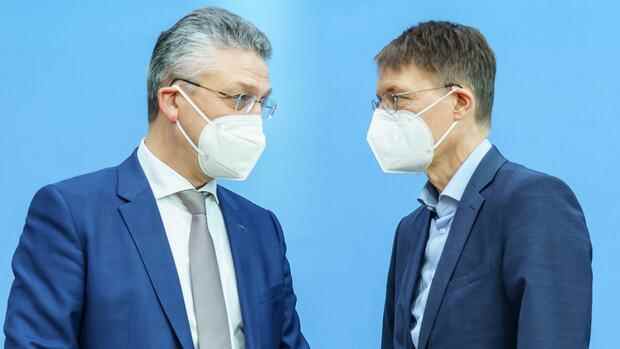These should “start immediately” and apply until mid-January. In a strategy paper, the institute recommends, among other things, closing restaurants immediately and extending the Christmas holidays for daycare centers and schools.
The RKI is part of the federal government’s committee of experts that made recommendations on Sunday evening for dealing with the new Omikron variant. These are the basis of today’s Prime Minister’s Conference.
According to a draft resolution, however, the measures planned by the federal and state governments are less strict. The paper sees plans for the period after Christmas to include contact restrictions for vaccinated and convalescent people and the closure of clubs and discos. In addition, major events such as soccer games should take place without an audience. The CDU-led states and the green-ruled Baden-Wuerttemberg also called on the federal government in a separate initiative from Tuesday lunchtime to promote the general compulsory vaccination.
Top jobs of the day
Find the best jobs now and
be notified by email.
In view of the potentially rapid spread of the Omikron variant, calls for even stricter measures became louder.
Calls for stricter measures
For example, Bavaria’s Prime Minister Markus Söder (CSU) called for the federal government to restore the epidemic emergency of national importance. No regional measures are needed here, but a national uniform framework, said Söder on Tuesday after a cabinet meeting in Munich.
Only the restoration of the epidemic emergency will give the possibility, in case of doubt, to be able to quickly decide on necessary steps such as a nationwide lockdown. “Everything else is such a mess.”
Söder criticized the draft resolution for the Bund-Länder-Round that “only partially covers the dimension of a possible challenge”. On the other hand, he warned against hectic or panic. With regard to Christmas, however, Söder said: “There will be no restrictions at Christmas.”
Baden-Württemberg’s Prime Minister Winfried Kretschmann (Greens) also called for the so-called epidemic situation to be declared again. “What else has to happen for it to be called out?” He asked.
The countries need the whole set of instruments in the fight against the virus. The constant readjustment does not do justice to the overall situation. “I will order a tour from Scholz,” he said, looking at the new Chancellor Olaf Scholz (SPD). A lockdown cannot be ruled out either.
Hamburg tightened measures
Hamburg’s mayor Peter Tschentscher (SPD) announced stricter measures as early as Christmas. Only a maximum of ten people are allowed to meet privately.
In addition, dance events would be banned from December 24th. The ban on dancing is effectively tantamount to closing clubs and discos.
There will also be a curfew from 11 p.m. for restaurants. An exception is planned for New Year’s morning. Then pubs, restaurants and bars are allowed to stay open until 1.00 a.m.
With a view to the new Omikron variant of the coronavirus, the RKI speaks of a “pandemic wave currently starting in Germany”. Even if this wave is still in its infancy in this country, a look abroad shows “that this variant will result in a wave of infections with a dynamic that has not yet been observed”.
Despite the remaining uncertainties, initial analyzes indicated that Omikron could identify the majority of cases of infection in Germany as early as January 2022, the RKI announced. There could be tens of thousands of Omikron infections per day. Under the current conditions, the doubling time in Germany is around three days.
The nationwide seven-day incidence fell slightly on Tuesday compared to the previous day – from 316.0 to 306.4 new corona infections per 100,000 inhabitants and week.
Virologists do not consider the recent drop in values to be the start of a more relaxed phase. Within one day there were officially 23,428 new corona infections and 462 deaths.
Focus on vaccinations
The federal and state governments place one focus of their fight against Omikron on the vaccination campaign. According to the template for the Bund-Länder-Round, it should also continue “over Christmas, on the days between Christmas and New Year’s Eve and on New Year’s Eve”.
The background is that unvaccinated people have a particular risk of getting seriously ill with Covid-19. Only those who have been vaccinated twice are not well protected against infection by Omikron and can also pass the virus on. Only a booster vaccination protects better against infection and transmission of Omikron – albeit not completely.
The Standing Vaccination Commission (Stiko) has therefore also shortened the time limits for booster vaccinations. All people who were previously recommended to have a booster vaccination six months apart after a double vaccination or an infection are advised to reduce the interval to at least three months from now on. The Stiko emphasizes that older or previously ill people should be given preference.
At least 27.1 million people have now received a Corona booster vaccination. That is 32.6 percent of the total population. At least 58.5 million people have been vaccinated twice or have received a single vaccination from Johnson & Johnson.
That is 70.4 percent of the total population. According to the figures, an average of 1.1 million vaccinations per day have been administered over the past seven days.
With agency material.
More: Contact restrictions and empty stadiums – this is what the federal and state governments want to decide against Omikron today
